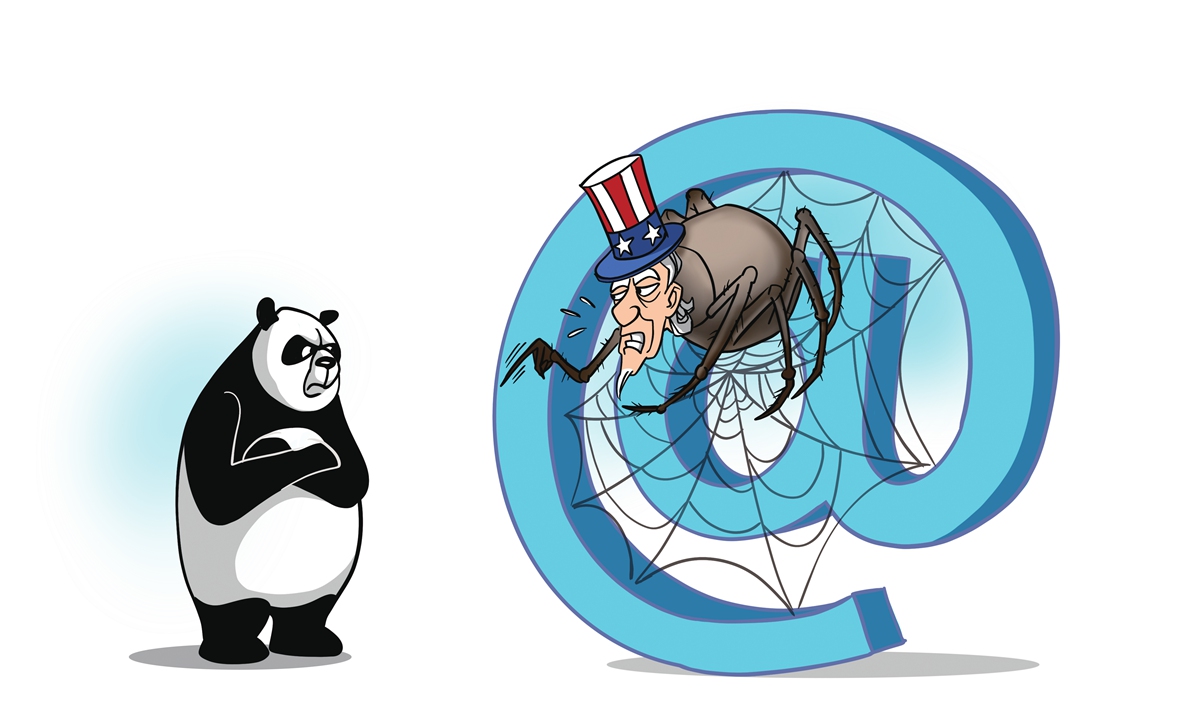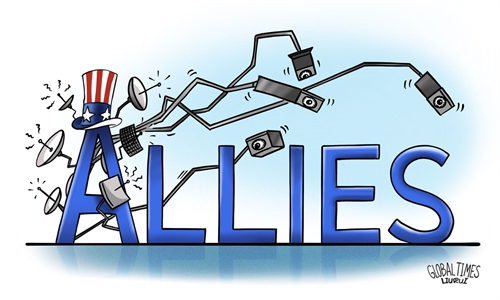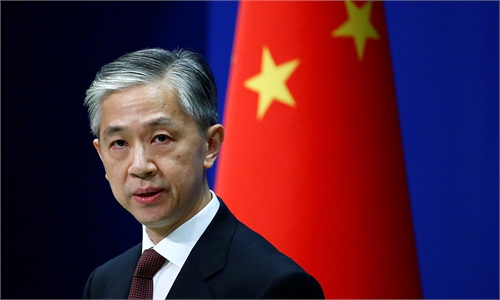
Illustration: Liu Rui/GT
The Insikt Group, a research team of US-based cybersecurity company Recorded Future, claimed in a recent report that "a suspected Chinese state-sponsored threat activity group RedFoxtrot," which launched a series of cyber threats targeting Central Asian and South Asian countries since 2014, is linked to the People's Liberation Army (PLA) Unit 69010 located in Xinjiang. The Voice of America on its website quoted "experts" to declare that the so-called Chinese cyberattack force is a combination of the PLA and the Ministry of National Security team. It further alleged that this team has turned China from a "second-tier" cyber country into a "world's top cyber threat" in more than a decade.For a long time, there have been voices supporting the West to portray the Chinese government and military as hackers. These false allegations have obvious political motives - hyping China's so-called cyber threat and stigmatizing China, so as to conceal the fact that the US is the world's largest cyber attacker, secret stealer and the veritable "matrix," like in the movies.
Recorded Future made the claim that RedFoxtrot and the Chinese military intelligence agency are linked. But tracing the source of cyberattacks is actually a very complicated process. And a random "cybersecurity company" does not have such an ability. The internet is an anonymous place, and the attacker will take all means to cover the attack. Therefore, tracing the source is very difficult.
Washington has accused China and other countries of launching cyberattacks against it. But most of the accusations are baseless, and did not go through judicial procedures. The company released a report criticizing "China's cyberattacks" and hyped it on media. Such reports are groundless, and many similar allegations are purely based on sensationalism.
There are many purposes behind these accusations. Companies would hope to use such reports to prove their technological strength - after all, isn't it powerful to trace the source of the so-called advanced hackers in China? There is a strong commercial purpose.
From the perspective of the US government, it aims more at stigmatizing China. The US' long-term strategy for China in the cyber field is to name and shame. This tactic has not been changed. The report accused China of targeting government, defense and telecommunications sectors across Central Asia, India and Pakistan. In fact, this is another strategy of the US - akin to its cyber geostrategy. It wants to destroy China's cyber image in these neighboring countries to damage China's relations with them.
In recent years, Washington has repeatedly accused Beijing of launching cyberattacks by brandishing the "big stick" of public opinion and pretending to be the victim. But in fact, Washington has never stopped its cyberattacks and infiltration around the world, posing a serious threat to the cybersecurity of all countries. Recently, a cybersecurity company counted 178 overseas hacker groups that have been tracked down for cyberattacks against important and sensitive Chinese institutions. Among them, 67 hacker groups, accounting for 37.6 percent, have their IP addresses in the US.
As the main implementer of the PRISM program, the US has been engaged in the world's largest cyberattack and theft for many years. Meanwhile, Washington has hypocritically accused Beijing of being the world's largest cyber-thief.
This is like the trick of a thief crying out to stop a thief.
The Chinese Foreign Ministry has made it clear that, as a victim itself, China opposes all forms of hacking and regards them illegal criminal activities that should be tackled in accordance with law and relevant international legal instruments.
The gap between China and the US in cyberspace is too wide. We conducted an experiment on this before. As an academic at a think tank, I used to get "phishing" emails from the US. I asked some technical experts to track these emails, and we found out that the critical infrastructure of the internet was actually all possessed in the US' hands.
In cyberspace, the strength of the US is very strong with stranglehold monopoly on many key resources. However, the US continually accuses other countries of carrying out false information or cyberattacks against it. Washington disguises itself as poor victims as a cover-up of their own cyber hegemony.
China is still a defender of its cyberrights. We are now more likely to stress the importance of cyber sovereignty too. That is, we do not want to attack others. And we hope others do not attack us.
The article is compiled by Global Times reporter based on an interview with Lu Chuanying, a researcher and secretary general of the Research Center for International Cyberspace Governance under the Shanghai Institute for International Studies. opinion@globaltimes.com.cn



